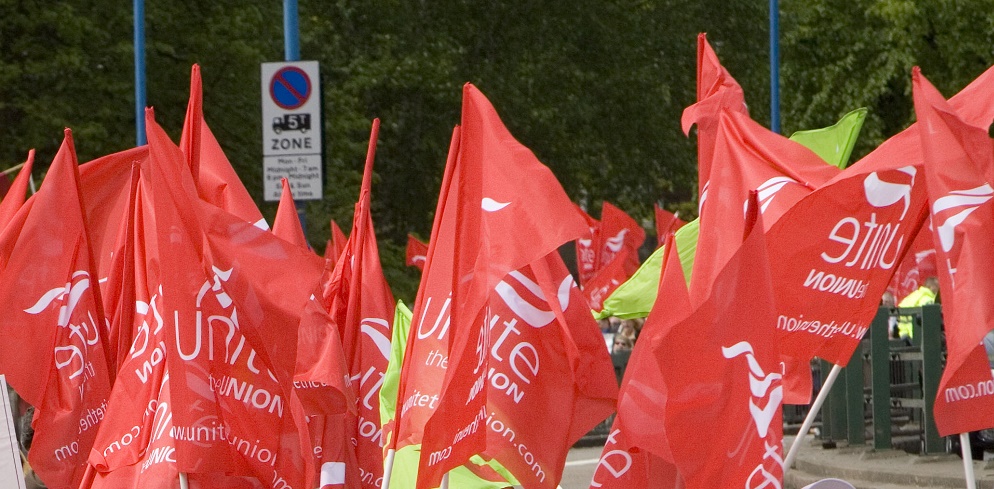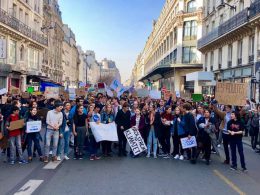Workers at Interface Europe, a flooring manufacturer based in Craigavon, have won a 15.25% pay increase after taking a week of effective strike action which shut down production at the site.
Neil Moore, the Unite regional officer representing the workers and a Socialist Party member said of the workers’ victory:
“This inflation-busting deal was won through militant, effective strike action which shut down production & forced bosses to share their profits with our members.”
With inflation surging past 11.7 percent, the company originally rejected the workers’ demands for an inflationary pay increase and instead offered a paltry 5.25%.
Interface workers had seen their pay stagnate for years, falling behind other workplaces. Meanwhile, Interface turned a £3.7 million profit in 2020 with the director earning 40 times workers’ basic pay.
Here we interview Don Murray, Unite rep at Interface, who spoke to us about why the workers voted to take strike action and how they made that action as effective as possible.
“There’s a history in this plant of paying below inflation pay rises. And I fully believe it’s actually a policy of the company…Year on year of that sort of race to the bottom effect had come to a head. The crisis and the cost of living just sort of magnified that…Striking was the only option we really had. It’s the only option any of us have – to withdraw our labour. It’s the final tool, the only effective tool we have.”
Workers overwhelmingly rejected the offer of 5.25% from management. In response, the company unilaterally imposed their pay offer on agency workers – in an attempt to skirt around the wider collective bargaining process and break the strike. Effectively organising agency workers will be crucial to building the trade union movement not just at Interface, but across all workplaces and industries in the years to come.
Despite the company’s attempts to stop industrial action, 98% of Interface workforce voted to strike. As Don told us this strike was the outcome of a long process of building up the union’s membership in the plant.
“Building on the strength of the union was key. Six months ago we only had about 16 members, we built that up to 100 members. You need to put the leg-work in, run round and explain to workers the benefit of being in a union – that there is strength in numbers, and that’s the only strength that we as union members have…Part of the work that was necessary was building back trust up in the union, which had been lost over the past few years.”
Don described how trust in the union was built back through the reps regularly communicating directly with the workforce, giving the workers the power to direct negotiations with management.
“That cut down on any rumours and let the members know there was no shenanigans going on, it was upfront and they were informed about it…And through that, word spread throughout the union members, they started talking together, there seemed to be more interest in the union. So we were able to recruit more members through that.”
The strength of the union at Interface was obvious on the picket lines, which were well organised and were able to completely shut down production at the site. Part of this was through the role of the strike committee that the workers set up.
“We’ve only got 3 reps in here, and to organise a strike on this scale with just 3 reps would be very difficult. So the first port of call was to create a strike committee…Those members put a great deal of work in organising, putting up gazebos, doing polls, making sure everyone was here in order to get their strike pay and things. So that was crucial to getting this up and running, and keeping it running, and making it as strong as it was. We couldn’t have done it otherwise.”
The fact that a week of strike action was able to win this improved pay offer shows the power workers have when they have a strong union and are prepared to take militant action. In as little as 3 months there will be another round of pay negotiations between Interface and their workers. In that context, we asked Don what sort of message this strike sent to the company.
“We’ve put manners on this company. We’ve earned respect, and we had to do it the hard way. The next time we go in to negotiate we have a far better hand to play. They will get flash-backs of gazebos going up, workers standing with flags, whistles being blown, not getting the lories out. We pretty much crippled this factory here and that is a message that they’re going to remember, hopefully for a very very long time. Next time we go in to negotiate we’ll have that behind us.”
The Interface pickets had a constant stream of people honking their horns when driving past to show their support, and other workers and union members came down to show their solidarity.
As the ballots were counted and the workers found out the offer had been accepted there was talk at the picket of other workplaces nearby balloting for strike action in the near future, and workers pledged to show their solidarity to those workers when the time comes.
In the North, we’ve seen something of a mini-strike wave in the first months of 2022 as workers in the public and private sector fight back against the cost of living crisis. This effective, militant strike action by Interface workers is a shining example of the power that working class people have.
It shows that by withdrawing our labour, and through maintaining effective pickets, workers can shut down production entirely and force the bosses’ to share more of the profits that workers produce.
As Don told us, “there’s a tired old phrase – there’s strength in numbers. That’s 100% true”. The Socialist Party calls for trade unions to fight the cost of living crisis by coordinating ballots across the public and private sector in order to have the most effective strike actions possible. If workers can shut down production so effectively in one workplace, by standing together then we can shut down the whole of society as well. Only by bringing all of the pressure of the organised working class to bear can we effectively fight this crisis and the profiteering of big business that is causing it.












